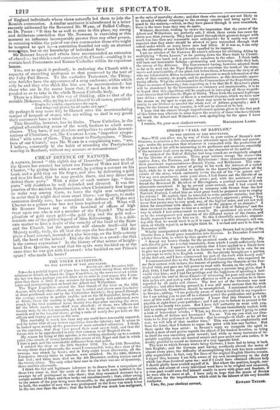THE NIGER EXPEDITION.
TO THE EDFIOR OF THE SPECTATOR. Blackheath, 15th December 1841. Blackheath, 15th December 1841.
SIR—As a painful degree of alarm has been excited among those who have relations or friends on board the Niger Expedition, by the news received within the last few days, perhaps you will allow me to state in your pages, why I con- sider that there is little it any occasion for despondency as to the fate of the brave and enterprising men on board the Albert and Wilberforce. The Niger Expedition entered the Nun branch of the river on the 12th August, with forty-three officers and one hundred and eleven men (exclusive of some gentlemen sent out by the Civilization Society); they passed through the swampy country in perfect health; and on the 3d September, being then at Iddah, where the country is high, rocky, and pretty well cultivated, were struck by the fatal remittent fever, twenty-two days atter entering the river. Of the whole number, one-third were attacked : of these, two officers and twenty men, by the last accounts, had died in the river on the voyage to As- cension and in the hospital there; giving a ratio of nearly five per cent on the officers and twenty per cent on the men. This mortality is much less than any one could have reasonably expected, and far below that of any former expedition into the interior ; but it seems to be looked upon merely as the precursor of more extended calamities. I think, on the contrary, that they have passed their most severe trial, and that the future risk to be apprehended is only that common to all Tropical rivers. My reason for being of this opinion, is the striking similarity up to a certain point (the attack of fever) between this ascent of the Niger and that in which I bore a part, and the remarkable difference from that point.
I entered the river on the 19th October 1832. On the 11th November, twenty-three days afterwards, the vessel I commanded, being then clear of the swamps, was struck by fever ; and in forty-eight hours afterwards, all the Europeans, twenty-three in number, were attacked. On the 24th, thirteen had died; and three more died on the 4th December, making sixteen out of the twenty-three. The only other fatal case in the river was one of dysentery, three months afterwards.
I think the fair and legitimate inference to be drawn from a comparison of these two cases is, that the seeds of the fever in both were imbibed in the swamps by all predisposed to take them ; that they remained dormant for a certain number of days, and then broke out simultaneously; that, either owing to the season of the year being more favourable, to the precautions adopted, or to both, the number of men who were predisposed to the fever was much fewer in the one case than the other ; that the fever itself was much less malignant,
as the ratio of mortality shows; and that those who escaped are not likely to be attacked without returning to the swampy country and being again ex- posed to the malaria,—which, as they have passed through it once unscathed, there is the more hope they may do again. Without, therefore, wishing to create the impression that the crews of the Albert and Wilberforce are perfectly safe, I think there exists less cause for alarm now than formerly. They have passed through their greatest danger with much less loss than any reasonable man anticipated: for it surely was never expected that they alone should be allowed to pass untouched through that ordeal under which so many brave men had fallen. If it was so, I can only say the absurdity of such belief is only equalled by its impiety. I am no admirer of Sir FOWELL BUXTON'S schemes for civilizing Africa by multiplying "Sierra Leones," or for putting down the Slave-trade by Christi- anity in the one hand and a preventive squadron in the other. I think both will turn out lamentable failures ; protracting and increasing, while they last, the misery of the Africans. The Government having, however, adopted them so far as to send out the Ni„oer Expedition to ascertain the truth of the state- ments and practicability of the plans laid before them, it becomes the duty of all who are interested in Africa to endeavour to procure as much information of the state of that country, its people, and its productions, as this favourable oppor- tunity affords. What the orders issued to the Commanders of the Expedition are, I have no means of knowing ; but, expecting as I do that Sir F. BUXTON'S plans will be abandoned by the Government as visionary and impracticable, it is to be hoped that this expedition will be employed in surveying all those magnifi- cent streams that fall into the Bight of Biafra. These form the natural highways into Africa : our ignorance of them is a national disgrace, which we have now the means on the spot to wipe out ; there may never be such another oppor- tunity in our lifetime to unravel the whole web of African geography; and I hope, for the honour of my country, it will not be allowed to be lost.
I hope that the sincere though unprofessional opinion given in the first part of this letter may alleviate in some degree the anxiety of those who have friends on board the Albert and Wilberforce ; and, apologizing for the space I have taken up,
I remain, Sir, your most obedient servant, MACGREGOR LAIRD.


























 Previous page
Previous page